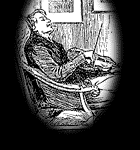

FR�DERIC FRAN�OIS CHOPIN
Polish FRYDERYK FRANCISZEK SZOPEN
(b. March 1, 1810, Zelazowa Wola, near Warsaw, Duchy of Warsaw [now in Poland]--d. Oct. 17, 1849, Paris, France)
Polish-French composer and pianist of the Romantic period, best known for his solo pieces for piano and his piano concerti. Although he wrote little but piano works, many of them brief, Chopin ranks as one of music's greatest tone poets by reason of superfine imagination and fastidious craftsmanship.
 “And now for lunch, and then for
Norman-Neruda. Her attack and her bowing are splendid. What’s that little thing of
Chopin’s she plays so magnificently: Tra-la-la-lira-lira-lay.”
“And now for lunch, and then for
Norman-Neruda. Her attack and her bowing are splendid. What’s that little thing of
Chopin’s she plays so magnificently: Tra-la-la-lira-lira-lay.”- A Study in Scarlet

![]()
![]()
- William S. Baring-Gould
The Annotated Sherlock Holmes, Vol. 1:
![]() "The principial, and for all practical purposes
insuperable, difficulty [in identifying that little thing of Chopin's] lies in the fact
... that Chopin never composed one single piece for the solo violin," Mr.
Paul S. Clarkson wrote in "In the Beginning..." "Indeed, 'four times only
did Chopin wrote for stringed instruments, and all four of the pieces contain parts for
the cello. Only once did he add violin: in the (G minor) Trio...' Of course, any piano
piece ever written can be 'arranged' for the violin, as everyone knows. But, as anyone
also knows, concert violinist rarely, if ever, perform piano pieces. And no one will be
suprised to hear that a search of all reported concert programs, for a period of several
years prior to the ocassion of Holmes' ... question, discloses not one Chopin opus played
by Mme. Norman-Neruda." Mr. Clarkson therefore suggested that Holmes, at the previous
concert (June 4, 1880) heard Charles Hall� play Chopin's Nocturne in E (Op. 60, No. 2),
and the Barcarolle in F sharp (Op. 60), also by Chopin, but also heard Mme. Norman-Neruda
play her favorite Handel's D major sonata. It was the sonata he was thinking of, but he
mistakenly attributed its composition to Chopin.
"The principial, and for all practical purposes
insuperable, difficulty [in identifying that little thing of Chopin's] lies in the fact
... that Chopin never composed one single piece for the solo violin," Mr.
Paul S. Clarkson wrote in "In the Beginning..." "Indeed, 'four times only
did Chopin wrote for stringed instruments, and all four of the pieces contain parts for
the cello. Only once did he add violin: in the (G minor) Trio...' Of course, any piano
piece ever written can be 'arranged' for the violin, as everyone knows. But, as anyone
also knows, concert violinist rarely, if ever, perform piano pieces. And no one will be
suprised to hear that a search of all reported concert programs, for a period of several
years prior to the ocassion of Holmes' ... question, discloses not one Chopin opus played
by Mme. Norman-Neruda." Mr. Clarkson therefore suggested that Holmes, at the previous
concert (June 4, 1880) heard Charles Hall� play Chopin's Nocturne in E (Op. 60, No. 2),
and the Barcarolle in F sharp (Op. 60), also by Chopin, but also heard Mme. Norman-Neruda
play her favorite Handel's D major sonata. It was the sonata he was thinking of, but he
mistakenly attributed its composition to Chopin.
![]() This is an ingenious suggestion, but it is only one of many
ingenious suggestions put forward by Sherlockian scholars. As Dr. Julian Wolff wrote
("Just What Was That Little Thing of Chopin's?"): "The great interest in
this question is evidenced by the amount of research that has been done and the number of
papers published." Here is a list of the important literature on the subject and the
conclusions reached by various authors, arranged in chronological order:
This is an ingenious suggestion, but it is only one of many
ingenious suggestions put forward by Sherlockian scholars. As Dr. Julian Wolff wrote
("Just What Was That Little Thing of Chopin's?"): "The great interest in
this question is evidenced by the amount of research that has been done and the number of
papers published." Here is a list of the important literature on the subject and the
conclusions reached by various authors, arranged in chronological order:
1. Warrack, Guy: Sherlock Holmes and Music. F minor Nocturne (Nocturne for piano, No. 15 in F minor).
2. Montgomery, James: Chopin in Baker Street. Etude in E major, Opus 10 (Etude in E major for Piano, Op. 10, No. 3).
3. Zeisler, Dr. Ernest Bloomfield: Tra-la-la-lira-lira-lay. Valse in E minor, No. 14 (Op. Posth.)
4. Thiman, Eric H., Mus. D.: Tra-la-la-lira-lira-lay. Mazurka in E flat minor, Op. 6, No. 4.
5. Christie, Winfried M.: Some Reflections on That Little Thing of Chopin's. Study in A minor, Op. 25, No. 11.
6. Harrison, Michael: In the Footsteps of Sherlock Holmes. The Impromptu in C sharp minor.
7. Smith, William: That Little Thing of Chopin's. Fourth Polonaise, in C minor.
Dr. Wolff himself offered "the timid suggestion that ... Watson was not quoting Holmes (or Chopin) at all, but was merely misquoting Tennyson (The Lady of Shalott): 'From the bank and from the river / He flash'd into the crystal mirror, / "Tirra lirra," by the river / Sang Sir Lancelot.'"
![]()
![]()